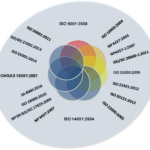Management education is essential to improve the technical manpower of our country. In Karnataka many Management and Technical institutions have ISO/NAAC/ NBA certificates but, it seems the quality of education in those institutions is not satisfactory. Some of the problem like lack of infrastructure; shortage of qualified faculty, student’s attitude towards learning, poor student results and placement in adequacy in the management organization. So this is the right time to give more importance to quality education. The implementation of Total Quality Management practices in management institutions will certainly help the students to get the quality education.
Change in economics and availability of modern management techniques and emphasis on information technology has made drastic changes in the whole situation under which today’s management libraries are needing to operate. The fusions of information technology and quality management have dramatically bearing on the functioning of the today’s management libraries in fulfilling the expectations of the library users. “Implementation of Total Quality Management in the library and information service environment poses interesting challenges on the road to potentially significant benefits” (Shafi, 2001).
A preliminary step in TQM implementation is always needed to assess the organization’s current reality. Relevant preconditions to deal with the present TQM needs, which are to do with the organization’s history and its elative participation for betterment, precipitating events leading to TQM, and the existing employee quality of working life are all to be considered with due consideration to the present applications and requirements. If the current reality does not include important preconditions, TQM implementation should be delayed until the organization is in a state in which TQM is likely to succeed.
While TQM is not normally thought of in terms of the library, it certainly can be used to increase the patron and employees satisfaction. As noted above, TQM can be used in any area in which an organization wants to improve. The scope of this study would be the use of TQM techniques in the management libraries in attempts to improve service to its patrons (customers) through the solicitation of user opinions and staff concerns.
Over the years, management libraries in Bangalore and elsewhere have been performing the traditional role of identifying, accessing, storing and disseminating information to a relatively small number of users. In recent years, things are gradually changing. In all types of libraries, the number of users is increasing. Students are now demanding quality service for their financial investment too. There is a need for the library managers to re-examine their traditional role and adopt an entirely new culture, which would satisfy the ever-increasing demand for improved and quality service to the clientele.
The objectives of this study are to identify the items in the operating systems and critical factors of integrated TQM in institutions and to develop the questionnaire for librarians of TQM implementation. Librarians are considered to be most important in management education.
In India, hardly few studies were conducted on Total Quality Management (TQM) in the management library system. As studies are scanty, little evidence is available on management library TQM functions. Hence, there is a need to study application of TQM in management college libraries for effective functioning.
Therefore, this study is an attempt in this direction into the realm of Total Quality Management applications in the management college libraries in Bangalore. This study is undertaken with a hope that TQM is a way of management helps to improve the effectiveness, efficiency, flexibility and competitiveness among the management colleges libraries.


